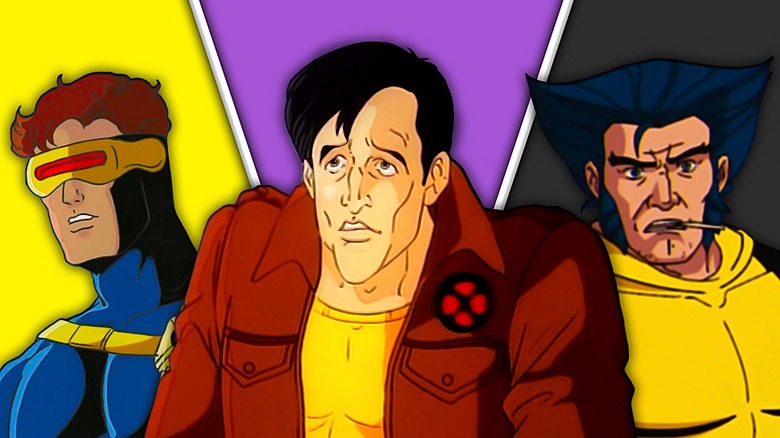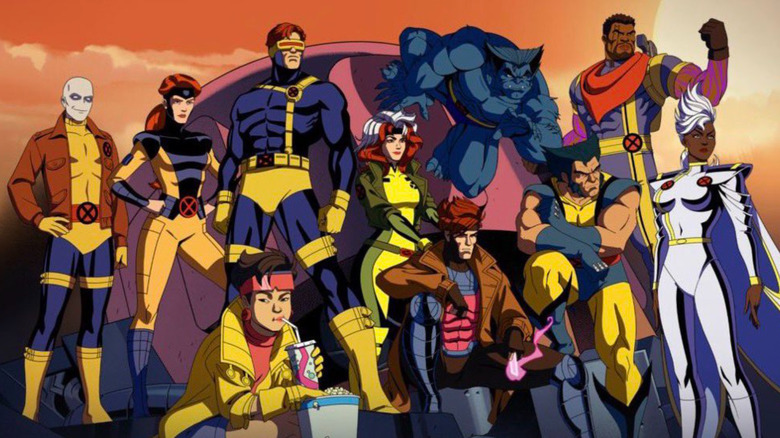X-Men '97 Confirms One Returning Marvel Mutant As Non-Binary
"X-Men '97" continues the classic "X-Men: The Animated Series" on Disney+, and with the beloved cartoon's return, a fan-favorite character from the original show receives a modern update that, frankly, makes perfect sense for the mutant hero.
In character profiles for the series debuting in Empire Magazine (via XMenUpdate on X), showrunner Beau DeMayo revealed that Morph is non-binary. DeMayo shares that the shapeshifter, who charmed fans in the original "X-Men: The Animated Series" before becoming a recognizable face in the comics, will get a new look alongside a much less heavy take on the character. "He really set the stakes," DeMayo said, "and he had a very interesting relationship with the team because of trauma." Despite his traumatic roots, DeMayo promises fans a "lighter take on the character," who has developed "an interesting buddy relationship with Wolverine." The showrunner also teased that the series may explore Morph's connection to Mister Sinister, the show's primary bad guy.
Morph has actually existed in the comics since the late 1960s. But when the body-changing hero was brought to the animated world in the iconic series, they were reinvented from Changeling to Morph. The character's original codename came under scrutiny by Marvel lawyers, who believed his name was too similar to DC's Beast Boy's original moniker and put the company in direct threat of legal action. As mentioned earlier, Morph's "X-Men: The Animated Series" arc is quite traumatic, as they're killed by Sentinels before being resurrected by Mister Sinister, who pits them against the X-Men. Once Morph breaks free from Sinister's control, they are left dealing with PTSD for the remainder of the series.
X-Men 97: Was Morph Always Non-Binary - And Does It Really Matter?
While Morph being revealed as non-binary might upset reactionaries looking for an excuse to call the long-progressive series "woke," this sort of reaction misses the entire point of the X-Men, who have always been intended to be an allegory for marginalized people. Giving the hero the updated identifier makes sense, even if they weren't classified as non-binary before. In the original "X-Men: The Animated Series," Morph often changes genders while shapeshifting, despite presenting as male in their "default" form. The fact that the X-Men hero sees themselves without a defined gender or adhering to specific gender roles is perfectly in line with their characterization. "X-Men '97" also updates Morph's appearance, giving them the bald, noseless look they sport in the comics, a design inspired by an alternate universe version of the character in Marvel's classic "Age of Apocalypse" event.
The X-Men roster is filled with characters who defy gender norms, such as the otherwise female-presenting shapeshifter Mystique being the biological father to Nightcrawler, the New Mutant Escapade being non-binary and trans, and Jessie Drake being the first openly transgender character in the Marvel Universe. More than 30 years after the first episode of "X-Men: The Animated Series" premiered, the continuation is doing what the franchise always has: reflecting real-world issues in a universe with mutant powers and appearances. Morph's being non-binary is simply a natural and fitting evolution for the character.
Audiences can see Morph and the rest of the X-Men when "X-Men '97" premieres on Disney+ on March 20, 2024.

